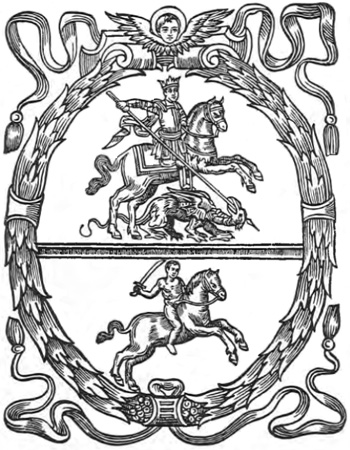Sviatopolk-Chetvertynsky
Sviatopolk-Chetvertynsky [Svjatopolk-Četvertyns’kyj] (often just Chetvertynsky). A Ukrainian princely family (see Nobility), descended from the Turiv-Pynsk or Volhynia appanage princes of the Riurykide dynasty, known from the late 14th century. The village of Chetvertnia on the Styr River in Lutsk county, Volhynia, was the ancestral estate of the Chetvertynsky princes. Prince Oleksander Chetvertynsky was first mentioned in documents dated 1388. Prince Fedir Mykhailovych Chetvertynsky was ambassador of the Lithuanian-Ruthenian state to Wallachia in 1492. In the 15th and 16th centuries two branches of the Sviatopolk-Chetvertynsky family developed; one settled in Stara Chetvertnia, and the other in Nova Chetvertnia. In the 16th century the Sviatopolk-Chetvertynsky family ruled over large estates in Ukraine (Volhynia voivodeship, Bratslav voivodeship) and Belarus. Certain members of the family later became Catholicized, but most remained fervent Orthodox believers, and some became high church dignitaries. They founded men's and women's monasteries in Stara Chetvertnia (Prince Hryhorii Chetvertynsky founded a printing press at the Transfiguration Monastery there in 1624) and a monastery in Nova Chetvertnia.
Among the members of the Stara Chetvertnia branch of the family were Prince Hryhorii Ostapovych Sviatopolk-Chetvertynsky (d 1651), the chamberlain of Lutsk (1647), who participated in church affairs, particularly in the nomination of Metropolitan Petro Mohyla (1632) and of Sylvestr Kosiv (1647). Hryhorii's son, Zakhar Sviatopolk-Chetvertynsky, served as an assistant judge in Lutsk (1647) and company commander (1649) and was a member of Adam Kysil's delegation to Bohdan Khmelnytsky in Pereiaslav (late 1648 to early 1649). Zakhar's son, Hedeon Sviatopolk-Chetvertynsky, was bishop of Lutsk and metropolitan of Kyiv. Hedeon's first cousin, Serhii Sviatopolk-Chetvertynsky (religious name: Sylvestr), was bishop of Mahiliou and of Belarus (1705–27). Hedeon's brother, Andrii Sviatopolk-Chetvertynsky, was a company commander of the Cossack standard in the Great Ruthenian principality (1660).
Andrii's sons, Yurii and Yanush Sviatopolk-Chetvertynsky, lived during the time of the Hetman state. Yurii Sviatopolk-Chetvertynsky (d ca 1717–22), the son-in-law of the former hetman Ivan Samoilovych, was a high-ranking administrative officer in Moscow and an opponent of Ivan Mazepa (although he had received estates in Galicia from him). Through the marriages of his daughters he became related to the Myklashevsky family, the Skoropadsky family, and the Kondratiev family. His brother, Yanush Sviatopolk-Chetvertynsky (d 1728), a colonel in service to the Russians, married Anna Vasylivna Kochubei, daughter of the general judge (she had been married to Ivan Obydovsky, colonel of Nizhyn regiment and Mazepa's nephew). Another member of the Stara Chetvertnia branch of the family was Antin-Stanyslav Sviatopolk-Chetvertynsky, the castellan of Peremyshl (1790), an adviser to the Torhovytsia Confederacy; he was killed by Polish insurgents in Warsaw in 1794. From him is descended the line of 19th-century Sviatopolk-Chetvertynsky nobles that governed estates in Belarus and Ukraine (Kharkiv gubernia).
Among the members of the Nova Chetvertnia branch of the family were Prince Stepan Sviatopolk-Chetvertynsky (b ca 1575, d 1659), the chamberlain of Bratslav, who participated in the renewal of the Orthodox hierarchy (under Theophanes III) in 1620 and is mentioned in Petro Mohyla's testament (1646). He was a leading member of that group of the Ukrainian Orthodox nobility that recognized the authority of the Zaporozhian Host. His son, Prince Illia Sviatopolk-Chetvertynsky (d 1641), however, a company commander, fought in the 1620s and 1630s against Cossack insurgents. Atanasii Kalnofoisky dedicated his Teraturgima (1638) to him, and the rector of the Kyivan Mohyla College, Ihnatii Oksenovych-Starushych, read a grave-side sermon during his funeral. Stepan's second son, Mykola Sviatopolk-Chetvertynsky (d 1659), was the castellan of Minsk and a relative of Hetman Ivan Vyhovsky. During the 18th century the Sviatopolk-Chetvertynsky princes of that branch served as castellans and chamberlains in Ukraine and Belarus; Oleksander Sviatopolk-Chetvertynsky (d 1769), the chamberlain of Bratslav, was an activist in the Confederation of Bar. That branch of the Sviatopolk-Chetvertynsky family became Catholicized in the late 17th and early 18th centuries; it ruled over large estates in Volhynia and Podilia until the 20th century.
Oleksander Ohloblyn
[This article originally appeared in the Encyclopedia of Ukraine, vol. 5 (1993).]

